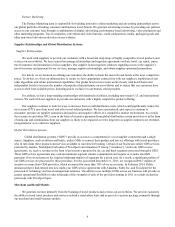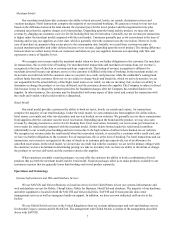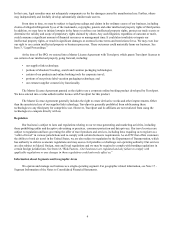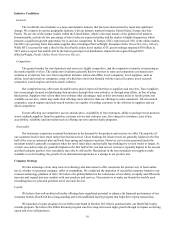Orbitz 2013 Annual Report Download - page 16
Download and view the complete annual report
Please find page 16 of the 2013 Orbitz annual report below. You can navigate through the pages in the report by either clicking on the pages listed below, or by using the keyword search tool below to find specific information within the annual report.16
launches of Google Places, Google Flights, and Google Hotel Price Ads (HPA). Google’s efforts around these products, as well
as possible future developments, may change or undermine our ability to obtain prominent placement in paid or unpaid search
results at a reasonable cost or at all. In addition, we currently license our search functionality, QPX Software, from ITA
Software, Inc., a subsidiary of Google.
Travel meta-search engines and content aggregators: Travel meta-search websites and travel research sites that have
search functionality, including Kayak.com (a subsidiary of our competitor Priceline), Trivago.com (a subsidiary of our
competitor Expedia), and TripAdvisor, aggregate travel search results for a specific itinerary across supplier, travel agent and
other websites. If these competitors limit our participation within their results, it could affect our traffic-generating
arrangements in a negative manner. In addition, some meta-search sites, such as Kayak.com, offer users the ability to make
reservations directly on their websites, which may reduce the amount of traffic and transactions available to us through referrals
from these sites.
Other competitors in the broader travel space: We also will continue to face competition from new channels of
distribution in the travel industry. Additional sources of competition could include “daily deal” websites, such as Groupon
Getaways, or peer-to-peer inventory sources, such as AirBnB. AirBnB and similar websites facilitate the short-term rental of
homes and apartments from owners, thereby providing an alternative to hotel rooms. The growth of peer-to-peer inventory
sources could affect the demand for our services in facilitating reservations at hotels.
There can be no assurance that we will be able to compete successfully against any current and future competitors or on
emerging platforms, or provide differentiated products and services to our customer base. Increasing competition from current
and emerging competitors, the introduction of new technologies and the continued expansion of existing technologies, such as
meta-search and other search engine technologies, may force us to make changes to our business models, which could affect
our financial performance and liquidity. Increased competition has resulted in and may continue to result in reduced margins, as
well as loss of customer, transactions and brand recognition.
Our business depends on our supplier and distribution partner relationships. Adverse changes in these relationships or our
inability to enter into new relationships could negatively affect our access to travel offerings and reduce our revenue.
We rely significantly on our relationships with hotels, airlines and other suppliers and travel partners. We enter into
agreements with these suppliers and travel partners at varying times and of varying duration. As a result, at any given point in
time, one or more of these agreements may be approaching expiration or renewal. Moreover, in order to enhance the
competitiveness of our offerings, we are constantly seeking to add new suppliers and travel partners. Adverse changes in any of
these relationships (whether upon expiration of an agreement or otherwise) or the inability to enter into new relationships could
negatively impact the availability and competitiveness of the travel products we offer on our websites and therefore could
adversely affect our revenue. If any of our major suppliers or travel partners significantly reduces their business with us for a
sustained period of time or completely withdraws from doing business with us, in favor of one of our competitors or to require
consumers to purchase services directly from them, it could have a material adverse effect on our business and ability to retain
customers.
In particular, airlines continue to look for ways to decrease their overall costs, including the cost of distributing airline
tickets through OTCs and GDSs, and to increase their control over distribution. The airlines have negotiated, and we expect
they will continue to attempt to negotiate, terms more favorable to themselves when the opportunity presents itself, such as
upon expiration of an agreement or in the case where the Company is distributing an airline’s services without a formal
agreement in place (which is currently the case with American Airlines). If airlines are successful in obtaining more favorable
terms in their agreements with us or in their agreements with the GDSs, or if an airline actually terminates an agreement with
us, the net revenue we earn from the distribution of airline tickets would be negatively impacted, which could have a material
adverse effect on our business, results of operations or financial condition.
For example, the Company temporarily discontinued its distribution of American Airlines (“AA”) tickets in 2010 after
the Company and AA were unable to agree to terms under which the AA tickets would be offered on our websites. If similar
situations were to occur with other airlines, it could reduce our access to air inventory, thereby putting us at a competitive
disadvantage and reducing our revenues.
Because we depend on a relatively small number of airlines and car rental companies for a significant portion of our
revenue in those areas, our business and results of operations could be adversely affected if suppliers consolidate in either of
these industries. If there is consolidation in either of these industries, the Company would be forced to negotiate with a fewer
number of total suppliers for the same number of segments, which would weaken our negotiating position and reduce our
ability to negotiate favorable rates on segments. Additionally, consolidation of one or more of the major airlines, including the
























